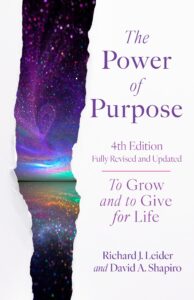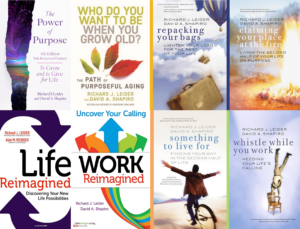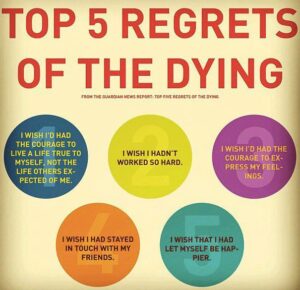Article Summary:
People today are living much longer, yet we still have the old narrative about aging as decline. We need a new narrative focused on purposeful aging. Excerpts from my conversation with best-selling author, Richard Leider, in the wake of the publication of the 4th edition of The Power of Purpose: To Grow and to Give for Life, with David Shapiro.*
+++
Gregg Vanourek:
Richard, I’ve always been fascinated by your Inventure Expeditions, where you’ve taken groups of people to Tanzania. Tell me about them.
Richard Leider:
I started in 1983. I was on the board of Outward Bound. We climbed Mount Kilimanjaro to raise money for them. I fell in love with Tanzania. It wasn’t just the animals; it was the people and the place.
I started to go back and lead my own trips there in 1985, and I led them every year until COVID hit. I’m planning on going back. My co-leader, who runs a safari company there, and I are looking at what we’re going to do next.
Sitting around the fire with elders over there for decades, I’ve learned a lot about what it means to be an elder and what it takes to survive. The hunter-gatherers I sit around the fire with have survived for 75,000-plus years. How? It’s not through competition and outwitting and outmuscling the other tribes. It’s through sharing, through purpose—and what they do as elders sitting around the fire.
The wisest of the elders sits the closest to the fire. What that means to me is that they have the wisdom to help younger people figure out how to make a difference and how to survive and thrive in the future.
Gregg:
It sounds like there’s a real ethic there of connecting across generations and of elders being honored and sharing wisdom in ways that many of us have lost in this society, where we have more mobile lives, and many narratives about aging that are negative.
You wrote about this in your last book, Who Do You Want to Be When You Grow Old? The Path of Purposeful Aging, with David Shapiro. It’s an excellent book. What else can people in modern societies learn from the Maasai tribe and other things you’ve learned from your time in the Serengeti?
Richard:
I’m a faculty member of the Modern Elder Academy, which Chip Conley created in Baja, Mexico and in Santa Fe, New Mexico. Chip said, What we really need are “menterns”: people who are both mentors and interns. I love that concept.
A mentor is somebody who can give something to younger people. And an intern is a learner. So, wise elders don’t just sit around the fire and pontificate. They’re also learners.
The future belongs to the learners, not the knowers.
I consider myself to be a learner. I know stuff and I can share what I know. But even more than that, I’m a learner. I’m learning all the time. I’m learning from you. You and I have shared ideas together, and we’ve learned from each other. I can mentor you, and you can mentor me. And I can learn from you, and you’re going to learn from me. It’s that combination, I think, that’s required right now in this world.
Gregg:
You and I are both very interested in the good life. We’ve talked about this before. In college, I took a philosophy and religion course called “Theories of the Good Life.” We studied it, and I wrote my own essay on what my view of the good life is. And my other philosophy professor encouraged me to live the big questions of life.
I think it was in your book, Repacking Your Bags, where you and David Shapiro gave a powerful definition of the good life: “living in the in the place you belong, with the people you love, doing the right work, on purpose.” Something like that. Can you say a little bit more about the place equation: living in the place you belong? How does place show up in a good life?
Richard:
Place is where you live. Many people move to a warmer place because of the weather. And it’s great for a period of time. But what they really wanted was relationships, work, and purpose. We want health and money.
I talk about the three Ms. When you look at the good life, if you step back from it, there’s money, medicine, and meaning.
Many people have enough money and enough medicine, by which I mean health, to live a good life. But there’s a drag there. They’re unhappy, or they’re depressed, and it’s often because they don’t have enough of the third M, meaning.
Money, medicine, and meaning are fundamental to the good life. My co-author, David Shapiro, is a philosophy professor. We studied Aristotle, Plato, and others, and we looked at the good life from that period of time to now. That’s how we came up with the four factors of place, people, right work, and purpose as the things that are most essential.
Gregg:
There are so many great thought leaders in this space. Viktor Frankl. William Damon. I want to ask you about Emily Esfahani-Smith and her book, The Power of Meaning. It’s a beautiful book. She says that part of that meaning equation is not only purpose but also storytelling and coherence: as we reflect on our life, we see the patterns that give us a sense of meaning in our lives. Do you think that’s a part of the equation here too?
Richard:
Absolutely. I ask people, What’s your narrative? I co-created the Life Reimagined Institute at AARP. We looked at, What’s the narrative on aging, and how do we change it? Because in 1900, people died when they lived to age 47. Now the fastest growing cohort in the U.S. is 85 and over, and people are living well beyond that. So, people are living 20, 30, 40 years longer than they did in the past. What’s the narrative for that? Is it just about playing golf, going fishing, traveling, or being with your grandkids? It’s not. There needs to be a new narrative.
Gregg:
My new body of work is focused on the common traps of living: What are the things that inhibit our happiness, our quality of life, our fulfillment? You’ve written about a “default life.” What’s a default life, and how is it negatively affecting us?
Richard:
I love that question. The default life is basically what I grew up with, and it goes like this:
Learn, earn, adjourn.
My Dad died at 68, two years after retiring. He had enough money and enough medicine, but I’m not sure he felt he had enough meaning. He worked for the same organization for 40 years, and he retired after that. He was an immigrant, and he had his struggles. He did okay, but then he didn’t, and he died. My mother lived another 10 years to age 78.
Dr. Becca Levy at Yale did a massive study that showed that people who had a positive view of aging live 7.5 years longer than people with a negative view of it. A negative view is like, Oh, this sucks. This is terrible. It’s all about decline.
So, what’s your narrative about aging? Do you think it’s possible that it could be a happier time of life? Or do you see it as a negative? Well, it has to do with health, has to do with place, has to do with people.
Gregg:
What are some other common traps of living that inhibit people’s happiness, quality of life, or fulfillment?
Richard:
The other thing is isolation. It’s fatal. It’s this notion that I can do it myself. I can do it alone, I’m cool, I’ve got it together. Going it alone is an incredibly bad idea. It’s a big trap. How do we get out of that trap?
I’m 80, and my wife is 77. We have a lot of friends and neighbors who are no longer growing and giving. If they’re not growing and giving and they’re not curious, we come home from dinner with them and go, What was that all about? They didn’t ask any questions. They weren’t curious and weren’t growing. They seem to be trapped in the rearview mirror.
I write about the rearview mirror versus the windshield. The windshield is 100 times bigger than the rearview mirror. How do people get out of the trap of the rearview mirror, just looking at the past and how they grew up? How do they let go of that? And how do they focus on the windshield, on what’s right in front of them and where they can go?
Gregg:
It makes me think, Richard, that some people are postponing the things that they really want to do. They’re deferring their dreams. And some people are thinking it’s too late to do the things they really want to do.
Richard:
Well, it’s never too late to make a difference in the lives of others. It drives me nuts when people just talk about their bucket list. I have bucket lists. I have things I want to do, but that’s not all my life’s all about.
What’s my life all about? It’s about purpose: Why are we here? What’s the point of this exercise called life? We’re here for a reason.
You get to decide, What’s the point? Why are you here, and why are you leading? What I know unequivocally is that why you lead determines how well you lead. Why you live determines how well you live. I know this from 50 years of study.
Gregg:
The subtitle of your new book, the fourth edition of The Power of Purpose, is “To Grow and to Give for Life.” I’m a big believer in growing and learning and developing. I’m just all in for that. It’s changed my life. It fills me with energy and inspiration.
And I see in you, Richard, an example of that. Here you are not “adjourning.” You’re not only giving but also growing. You’re learning, you’re writing new books, you’re updating your thinking, you’re talking to people. And I see the life it brings to you.
So, I just want to honor you, and thank you for that, for the impact you’re having on people, including deeply on me. Is there anything else you want to say about this?
Richard:
What does growing really mean? Growing means curiosity, being curious about self, about others, about the world, and not just knowing.
As people age, they want to remain relevant, even though they don’t know how to say that. And they want to be visible. They want to have a voice in matters. And that comes not just from age or position or role. It comes from curiosity.
The founder of TED, Richard Saul Wurman, said that the core of TED is curiosity. It was founded based on, What are you really curious about? What do you want to know more about? What do you want to connect with? I think choice, curiosity, courage: those are the three Cs that represent what we’ve talked about here today.
Choice: What are your choices?
Curiosity: What are you curious about?
Courage: What are you courageous enough to make a move on?
* Video conversation between Gregg Vanourek and Richard Leider via Zoom, recorded, transcribed by Otter.ai, and then edited by Gregg.

Gregg Vanourek is a writer, teacher, and TEDx speaker on personal development and leadership. He is co-author of three books, including LIFE Entrepreneurs: Ordinary People Creating Extraordinary Lives (a manifesto for living with purpose and passion) and Triple Crown Leadership: Building Excellent, Ethical, and Enduring Organizations (a winner of the International Book Awards). Check out his Best Articles or get his monthly newsletter.
Richard Leider is an internationally best-selling author, coach, and keynote speaker who’s widely viewed as a thought leader of the global purpose movement. His work is featured regularly in many media sources, including PBS and NPR. He is the founder of Inventure—The Purpose Company, a firm created to guide people to live, work, and lead on purpose.
Gregg’s Tools for You
- Traps Test (Common Traps of Living) to help you identify what’s getting in the way of your happiness and quality of life
- Quality of Life Assessment so you can discover your strongest areas and the areas that need work, then act accordingly
- Passions Probe to help you find the things that consume you with palpable emotion over time
Related Articles & Books
- “How to Discover Your Purpose”
- “The Problem with Not Being Clear About Our Purpose”
- “The Most Common Myths about Purpose”
- “Unlock Your Purpose–3 Key Elements”
- “Unlock the Power of Purpose in Your Work and Leadership“
- “Don’t Retire, Reawaken and Refire“
- Richard Leider and David Shapiro, The Power of Purpose: To Grow and to Give for Life (4th edition, Berrett-Koehler, 2025)
- Becca Levy, Breaking the Age Code: How Your Beliefs About Aging Determine How Long & Well You Live (William Morrow, 2022)
Postscript: Inspirations on Purposeful Aging
- “Retire from your job but never from meaningful projects. If you want to live a long life, you need eustress, that is, a deep sense of meaning and of contribution to worthy projects and causes, particularly, your intergenerational family.” -Stephen R. Covey, educator and author
- “Age has given me what I was looking for my entire life. It has given me me.” -Anne Lamott, writer
- “Here’s a test to find whether your mission on earth is finished: If you’re alive, it isn’t.” -Richard Bach, writer
- “Aging is an extraordinary process whereby you become the person you always should have been.” -David Bowie, musician
- “The old … should… have their physical labors reduced; their mental activities should be actually increased. They should endeavor, too, by means of their counsel and practical wisdom to be of as much service as possible to their friends and to the young, and above all to the state.” -Marcus Tullius Cicero, Roman philosopher and statesman
- “There are years that ask questions, and years that answer.” -Zora Neale Hurston, author, anthropologist, and filmmaker
- “Age puzzles me. I thought it was a quiet time. My seventies were interesting and fairly serene, but my eighties are passionate. I grow more intense as I age…. To my own surprise I burst out with hot conviction.” -Florida Scott-Maxwell, Jungian analyst
“Wholly unprepared, they embark upon the second half of life…. But we cannot live the afternoon of life according to the program of life’s morning; for what was great in the morning will be little at evening, and what in the morning was true will at evening have become a lie.”
-Carl Gustav Jung, Swiss psychiatrist and psychoanalyst































